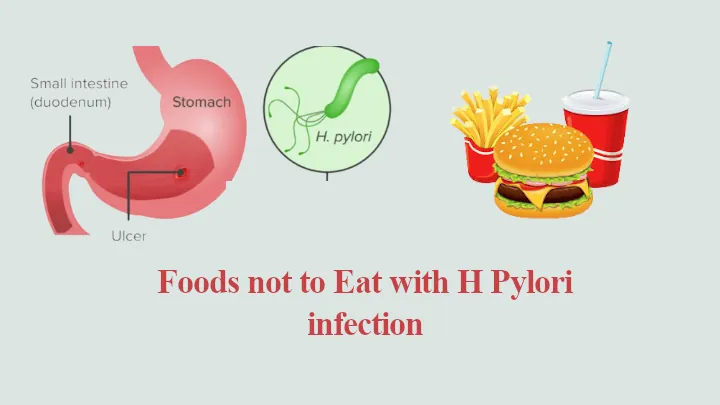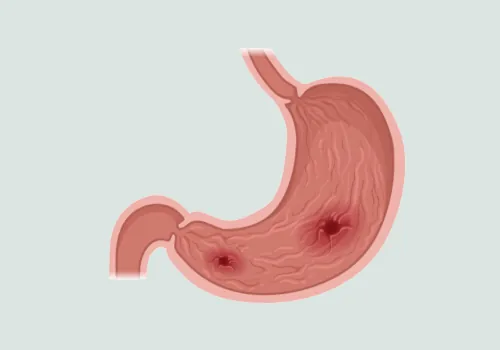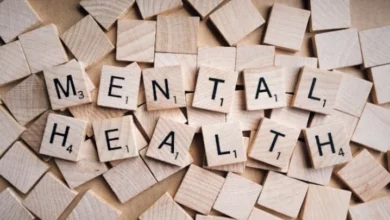16 Foods not to Eat with H Pylori infection must Be Avoid

Looking for foods not to eat with H Pylori? A type of bacteria called Helicobacter pylori (H. pylori) can infect the stomach lining and result in various digestive symptoms like nausea, bloating, and abdominal pain.
While medications are normally used to treat H. pylori infections, several dietary modifications can also help to reduce symptoms and speed up recovery. Particular foods should be avoided by those who have H. pylori infection since they can increase symptoms and slow healing.
This article will discuss what foods are bad to eat with h pylori and other factors that can impact H. pylori’s symptoms and healing.
In This Article
Foods not to Eat with h Pylori
What not to eat when u have h pylori; here is the list-

1. Spicy Foods
The worst food to eat with h pylori is spicy food. Spicy foods can aggravate the symptoms of H. pylori, such as nausea, bloating, and abdominal pain, by irritating the lining of your stomach.
2. Fried foods
Fried foods may be high in fat and challenging to digest, which could irritate your stomach lining and worsen H. pylori symptoms.
3. Acidic foods
Citrus fruits and tomatoes are acidic foods that can increase stomach acid production and aggravate H. pylori symptoms, especially if you already experience acid reflux or heartburn.
4. Dairy products
Some H. pylori sufferers may also be lactose intolerant, which means consuming dairy products might make them feel sick to their stomachs and result in diarrhea, gas, and bloating.
5. Carbonated Drinks
Carbonated drinks may increase H. pylori symptoms, particularly if you already have a sensitive stomach, as they can lead to bloating, belching, and gas.
6. Caffeine
The symptoms of H. pylori, such as acid reflux, heartburn, and stomach discomfort, can worsen due to caffeine’s ability to speed up the formation of stomach acid.
7. Alcohol
Alcohol can aggravate stomach lining irritation and increase stomach acid production, which may exacerbate H. pylori symptoms like nausea, vomiting, and abdominal pain.
8. Processed foods
Foods you should not eat with h pylori are processed foods. Foods that have frequently been fried have high levels of sugar, salt, and unhealthy fats that can irritate the lining of your stomach and increase H. pylori symptoms, including bloating, constipation, and diarrhea.
9. Red meat
Foods not to eat with helicobacter pylori is Red meat because Red meat can be challenging to digest and may increase stomach acid production, exacerbating H. pylori symptoms, including bloating and abdominal pain.
10. Artificial Sweeteners
Artificial sweeteners, including aspartame and sucralose, can irritate the stomach and worsen some people’s H. pylori symptoms, like diarrhea, gas, and bloating.
11. Chocolate
In particular, if you already experience acid reflux or heartburn, chocolate’s caffeine content and potential to boost stomach acid production could make H. pylori symptoms worse.
12. Raw veggies
Raw vegetables may be difficult to digest and irritate your stomach if you have H. pylori, especially if they are heavy in fibre or contain tough skins or seeds. Cooking vegetables can make them easier to digest and less likely to cause digestive discomfort.
In addition, what should you not eat with h pylori the following factors may exacerbate H. pylori symptoms or delay healing:
13. Smoking
Smoking can harm H. pylori infection and related symptoms. It can irritate the stomach lining, leading to inflammation and impaired healing of H. pylori-related ulcers.
Quitting smoking can be beneficial for individuals with H. pylori infection. It can help reduce the severity of symptoms and speed up the healing process.
14. Stress
The symptoms of H. pylori can be greatly exacerbated by stress. The hormone cortisol, which can increase the production of stomach acid, is produced by the body when it is under stress. This may result from increased symptoms like nausea, stomach pain, and diarrhea.
15. Non-steroidal anti-inflammatory medications
Aspirin, ibuprofen, and naproxen are NSAIDs that might aggravate the symptoms of H. pylori, especially if taken regularly or in large dosages.
16. Antibiotics
Although antibiotics are frequently used to treat H. pylori infections, they may also have adverse effects on the digestive system, including diarrhea, bloating, and gas. They may also disturb the normal balance of gut bacteria.
Frequently Asked Questions & Answers
Q. What to eat for h pylori infection?
Ans- For individuals with H. pylori infection, a diet packed with fruits, vegetables, whole grains, lean proteins, and healthy fats is often advised.
Fermented foods like yogurt and kefir, which contain probiotics that can help restore the balance of gut flora, are some specific foods that may be helpful.
Q. What foods kill h pylori?
Ans- Garlic, broccoli sprouts, cranberry juice, honey, green tea, Probiotics and other foods are all linked to antibacterial effects against H. pylori. Although these foods may have some antibacterial properties, it is essential to remember that they cannot replace medical treatment for H. pylori infection.
Q. What foods can increase h pylori?
Ans- Some research suggests that a diet high in salt, Acidic foods, Processed foods and red meat may increase the risk of developing H. pylori infection. Eating contaminated food or water can also increase the risk of infection.
In Conclusion
To control the symptoms and promote healing, people who have an infection with H. pylori should be careful about the foods they eat. Meals that may exacerbate H. pylori-related symptoms include dairy products, processed meals, alcohol, and spicy and acidic foods, and they should all be avoided or consumed in moderation.
Additionally, reducing stress, giving up smoking, and staying away from NSAIDs can all aid in symptom relief and healing.
References
- Diet and Helicobacter pylori infection
- Diet, Helicobacter pylori infection, food preservation and gastric cancer risk
- Dietary Factors in Relation to Helicobacter pylori Infection





